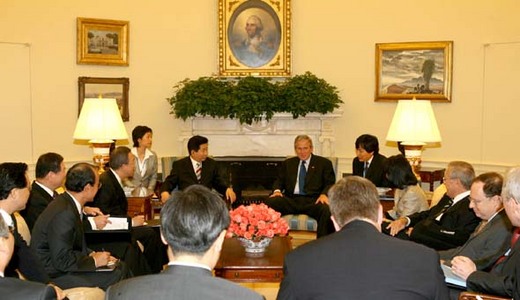 |
|
President Roh Moo-hyun and his U.S. counterpart George W. Bush hold a summit meeting at the White House on September 14 (washington time).
|
One week after summit, ‘common’ approach to North already showing cracks
South Korea and the United States are scheduled to hold a working-level meeting on September 20 to discuss follow-up measures on the so-called "common and comprehensive" approach in dealing with the North Korea nuclear issue, an approach unveiled by the two countries’ leaders during a September 15 summit in Washington. However, the two sides are already diverging over whether to impose additional sanctions against the North. On September 18, two separate press conferences were held just one hour apart by South Korea’s Ambassador to the U.S. Lee Tae-sik and a U.S. State Department official. The two press conferences served as yet more proof of differences between Seoul and Washington over how to deal with the North. Washington agrees upon the need for a new approach, but argues that sanctions and negotiations should be pursued separately. Seoul says that it understands the U.S. stance but takes issue with the timing of imposing sanctions, saying that efforts are underway to woo the North back to the stalled six-party talks. In their recent summit, President Roh Moo-hyun and his U.S. counterpart George W. Bush reportedly reaffirmed their commitment to resolving the North Korea nuclear issue in a peaceful way. According to Seoul officials, the two sides did not mention sanctions during the talks, apparently because it would have only confirmed differences in their stances."Both sides agreed to return to the September 19 Joint Statement in order to resume the six-party talks," Lee Tae-sik, South Korean ambassador to the U.S., said in a press conference held to brief the results of the summit. "Sanctions and resumption of the six-party talks need to be dealt with separately." The September 19 Joint Statement was signed last year at the conclusion of the fourth round of six-party talks. It included what many observers consider a concrete and workable blueprint for resolving the North Korean nuclear issue. Lee said there is no disagreement that the North should be held accountable for its own actions, but that the consensus in Seoul is that it would be inappropriate to pursue sanctions against the North outside of the resolution adopted by the U.N. following the communist country’s missile tests in early July. The ambassador’s remarks, however, starkly contrast with word from Washington. A U.S. State Department official, who declined to be named, said the U.S. is considering the reinstatement of sanctions lifted in 1994, but added that it is only part of several options being discussed. The official said he understands Seoul’s concerns and no decisions have yet been made. But he still "welcomed" moves by Japan and Australia to impose additional sanctions against the North. The U.S. still opposes any incentives for the North unless the communist state returns to the stalled six-party talks. As President Bush has said, the only choice remaining for the North is to rejoin the multilateral negotiations, which involve the two Koreas, the U.S., Russia, Japan, and China. For the past one-and-a-half years, both sides have also been divided over how to deal with the issue of Banco Delta Asia (BDA), which led to the stalemate of the six-party talks. The Bush administration argues that the bank - which was last September named in a U.S. report on North Korean counterfeiting and subsequently froze its assets from Pyongyang - is strictly a law enforcement issue and should not be linked to the six-party talks. Admitting the BDA issue is one of the two major elements in the "common and comprehensive" approach proposed by Seoul, Washington still says that the investigation is currently underway, making it difficult to know when the probe will be finalized. Some Seoul officials, however, are casting doubt over the protracted investigation into the bank, hinting that Washington does not have a strong will to put an end to the issue. They also think that an investigation without concrete evidence will only provide an excuse for the North to reject returning to the talks.






